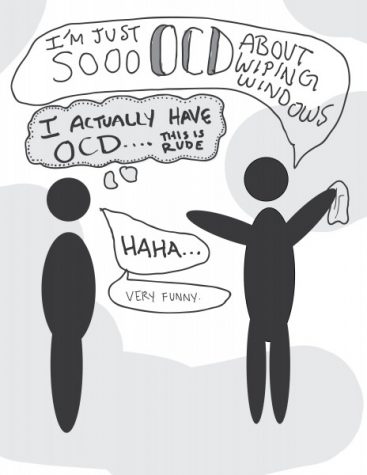Think before you diagnose
October 9, 2019
English has a lot of hyperbole embedded into it, and a good amount of it stems from internet culture. Slowly but surely, as more and more internet slang becomes normalized in everyday speech — such as friends un-ironically saying “LOL” out loud and “And I oop-” outside of Twitter — the exaggerative qualities tend to come with it. There’s nothing inherently wrong with this development, but there are unfortunately some unwanted side effects that come at the cost of the comfort and safety of others.

Most of the time we don’t tend to think about how our language affects others in small ways. We may say, “Oh I hate her!” when we simply intend dislike, or “This experience was awful” when it was inconveniencing at most. The exaggeration we use in everyday language becomes, at best, very passionate and, at worst, harmful to social perceptions.
In neurotypical people, many of these may seem socially obvious — where the implicit nature of these phrases is understood through social experience and connotation — but it isn’t always obvious or safe for their mentally ill and neurodivergent peers.
Mental illness and neurodivergence is very rarely apparent to the untrained eye. It would be difficult to tell if someone has bipolar disorder or is on the spectrum without interacting with them for some amount of time, especially if they’re medicated or considered “high-functioning.” Because of this perceived “invisibility,” people are sometimes unaware of the offense they might cause people.
Yet, you would think if someone does know, they would correct their phrases and try not to offend someone, right? You would think, but it’s far more complicated than that.
When someone says something seemingly innocent like, “This gives me anxiety!” or “I feel depressed today,” these can become what are considered microaggressions towards the mentally ill via two very specific mechanisms: Reductionism and Improper Symptomization.
When you reduce a panic attack, a debilitating physiological reaction to an emotionally triggering situation, to pre-test jitters, it does two things. First, it invalidates and gaslights those who do suffer from things like panic attacks or manic episodes, making them think that if someone can deal with them in such a way — such as neurotypical reactions and processing of situations — they should also be able to in a similar way, and if they can’t, it must be something wrong with them. Secondly, it reduces the severity of the symptoms to the outside world. In a situation where someone only has the “neurotypical” framework of how a panic attack goes, people will not take actual instances as seriously and can lead to dangerous physical and social health implications.
Think of it like this: if every time someone had a coughing fit they called it an asthma attack, how do you think everyone would be equipped to handle an actual asthma attack? Would they know what to do? Or would they just let you deal with it because everyone else who said they were having one could on their own?
Unfortunately, while you might think it’s cute to call yourself a “Cr*zy/Ps*cho girlfriend,” people with psychotic disorders like Schizophrenia are called those things as slurs. So, yeah, it might still be cute to you to attribute jealous and toxic behavior in a relationship to being “cr*zy” but it’s also exposing your internal biases towards others who are mentally ill. You are functionally telling the world that you know enough about mental illnesses to attribute traits to them, and you don’t care enough to be careful with how you describe it. It might be really easy to say someone has multiple personalities or bipolar when you think they’re being fake, but really it’s equating people who have those disorders to people who you don’t trust and are inherently fake.
Mental health Awareness week: STOP CALLING PPL CR*ZY, & PS*CHO. Start being empathic w people with other neurodivergences that aren’t depression & anxiety.
— ⚔️ ketaprincesa ⚔️ (@rcklssfxg) October 8, 2019
Habits, especially in language, are very hard to break. Yet, we have to make a concerted effort to move beyond simple awareness of the existence of mental illness and bring about positive changes to make social environments and interactions safer and more inclusive spaces for everyone.









Oliver • Oct 16, 2019 at 8:52 am
This doesn’t speak to the content of the article at all, but the phrase “First, it invalidates and gaslights those who do suffer from things like panic attacks or manic episodes” is a serious misuse of the word gaslight. Gaslighting refers to an abuse tactic where the abuser psychologically manipulates a victim by directly stating and lying about something that happened to them, usually the abuse itself. The use of the word gaslight in this context, as a synonym for dismissing someone’s experience, that this article uses does the same minimizing of language that this article argues against. A quick google search regarding the abuse of the word gaslighting in journalism as a synonym for word like “lying” showed me some good article on this. Please consider using a different term!
Harold A Maio • Oct 10, 2019 at 11:57 am
Please stop telling people there is a stigma to mental illnesses. Mind your manners.